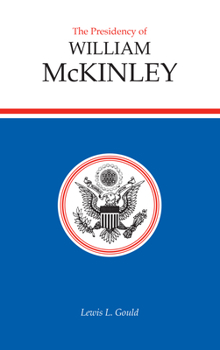The Presidency of William McKinley
(Part of the American Presidency Series Series)
Select Format
Select Condition 
Book Overview
In this interpretation of the McKinley presidency Lewis L. Gould contends that William McKinley was the first modern president. Making use of extensive original research in manuscript collections in the United States, Great Britain, and France, Gould argues that during McKinley's four and a half years in the White House the executive office began to resemble the institution as the twentieth century would know it. He rejects the erroneous stereotypes that have long obscured McKinley's historical significance: McKinley as the compliant agent of Mark Hanna or as an irresolute executive in the Cuban crisis that led to war with Spain. He contends that McKinley is an important figure in the history of the United States because of the large contributions he made to the strengthening and broadening of the power of the chief executive. While this volume touches on many aspects of McKinley's leadership, the core of it relates to the coming of the Spanish-American War, the president's conduct of the war itself, and the emergence of an American empire from 1898 to 1900. According to Gould, the Spanish-American War was not the result presidential weakness or of cowardice before public hysteria. McKinley sought to persuade Spain to relinquish Cuba peacefully, turning to war only when it became apparent that Madrid would never acquiesce. During the war, McKinley effectively directed the American military effort and the diplomacy that brought territorial acquisitions and peace. The process of making peace with Spain--involving, as it did, American annexation of the Philippines--and of securing the ratification of the resulting treaty in the Senate underscored McKinley's expansive view of presidential power. He functioned as chief diplomat, from the sending of senators on the peace commission to the personal supervision of the terms of the negotiation. At home he made tours of the West and South in 1898 to lead popular opinion to his position as no president had done before him. For the Senate he evidenced a readiness to dispense patronage, woo votes with personal persuasion, and marshal the resources of the political system behind his treaty. Later episodes in McKinley's administration support Gould's thesis. In administering Puerto Rico and Cuba and in suppressing an insurrection in the Philippines, McKinley relied further on the war power and continued to shape affairs from the White House. He sent troops to china during the Boxer Rebellion in 1900 without congressional authorization, governed the new possessions through presidential commissions, and allowed Capitol Hill only a subsidiary role in the process. By 1901 the nation had an empire and a president whose manner and bearing anticipated the imperial executives of six decades later. Gould does not argue that McKinley was a great president. He maintains, instead, that what McKinley contributed to the office, the examples he offered and the precedents he set make him an important figure in the emergence of the modern presidency in this century.
Format:Hardcover
Language:English
ISBN:0700602062
ISBN13:9780700602063
Release Date:January 1981
Publisher:University Press of Kansas
Length:308 Pages
Weight:1.55 lbs.
Dimensions:1.1" x 6.3" x 9.4"
Customer Reviews
3 ratings
Karl Rove And I Agree (Really) That McKinnley Is One Of The Best Presidents
Published by Thriftbooks.com User , 14 years ago
This book serves up a history of the McKinley Administration. This administration is interesting because it is the first modern presidency. McKinley was the first to deal with America's place on the world stage, and modern communications. He was the first to deal with the modernization of industry and its affect on governmental structure. All these experiences are detailed in this book, and it is done so in a way that reflects the lack of certainty with which McKinley faced these issues. What we see is that many of today's traditions and structures rests on the informed opinion of a man dealing with a lack of complete knowledge. This happens time and time again during this administration and Gould gets it. This book is enjoyable and very readable, so get it and enjoy.
William McKinley
Published by Thriftbooks.com User , 16 years ago
America emerged as a world power. After the Civil War, the idea spread that it is better to fight abroad. America fought the Spanish-American War in 1898 under McKinley. Puerto Rico, Cuba and the Philippines were freed from Spain. Hawaii was annexed. Alaska's highest mountain and the highest in North America was named after McKinley although the state of Alaska prefers to call it by its Indian name, Denali. McKinley was assassinated by an anarchist named Leon Franz Czolgosz.
modern president
Published by Thriftbooks.com User , 24 years ago
This is one of the best in the UKanss Presidency series. Gould makes an effective argument that McKinley was the first modern president. This account helps to dispell the notion that McKinley was no different than the other Gilded Age Presidents. A really good read!






